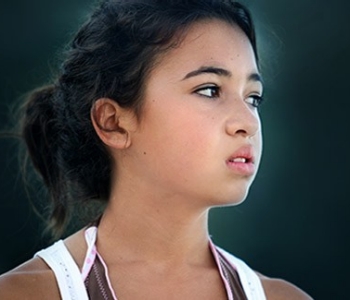One in Four Teen Girls Self-Harm. Here's How You Can Help.

Girls are amazing. They’re strong, funny, and thoughtful. They’re innovative and gutsy. They’re loving and adventurous. But beyond all of those wonderful qualities, roughly a quarter of girls today are also hurting themselves. That might sound extreme, but studies show that nationwide, one in four adolescent girls has deliberately harmed herself in the past year. In some regions of the country, rates of self-harm are closer to one in three.
Many of you might be thinking, “not my girl!,” and we hope you’re right. But that doesn’t mean self-harm doesn’t affect your daughter’s world.
“It can be hard to understand why a young person with her whole future ahead of her would purposefully hurt herself,” says Girl Scouts’ developmental psychologist Dr. Andrea Bastiani Archibald. “Self-harm is too often a response to stress or anxiety that can be used to either distract from feelings or control them.” And in today’s stressful world, the rates of self-harm among girls are high enough that a friend in your girl’s circle may be suffering.
“Even suspecting that a friend, teammate, or classmate is hurting herself could make your girl feel confused, sad, angry, or responsible for fixing things,” Dr. Bastiani Archibald explains. “It’s a complicated issue, and one that young people shouldn’t have to face alone.”
Here are three ways you can be there for your girl and make her more likely to turn to you if she needs extra support.
1. Tackle the topic head on
It’s unlikely to be
something you ever specifically want to talk about, but when you bring
up the topic of self-harm, you let her know that the issue isn’t
off-limits and that you’re open to her questions and concerns. Ask her
what she knows about self-harm and whether her friends have talked
about it. You can also ask if she’s worried about any of her friends
engaging in this behavior. Acknowledge that self-harm can be
confusing, and help her understand that it isn’t anything to joke
about or take lightly—it’s not something that makes a person “cool” or
a sign that they’re weak. It suggests that someone is stressed,
depressed, or upset, though it’s not necessarily a sign of suicidal thought.
2. Find the line between supporting a friend and shouldering the
problem
Because she is caring and compassionate, there’s
a chance that your girl may feel moved to do anything and everything
in her power to help her friend get better. Your girl’s heart is
certainly in the right place, but it’s important for her to create
healthy boundaries and know that when people abuse themselves, only
they can take charge and stop the harmful behavior.
Additionally, she may feel torn over what to do if she is asked to
keep the self-harm a secret. Remind her that friendship means
caring—and that caring includes keeping people safe. If her friend is
hurting herself, she’s in danger and needs help. Turning to a caring
adult (like yourself, a school counselor, favorite teacher, or coach)
is the ultimate act of kindness and friendship—even if the other girl
doesn’t see it that way at first. Make sure your girl understands that
when it comes right down to it, she can’t control her friend’s
actions, and that although it’s noble and kind to step up and be a
friend, it’s not her responsibility to save the day.
3. Show her healthy ways to manage her emotions
Many
people who deliberately hurt themselves turn to self-harm as an outlet
for extreme feelings. Help your daughter be prepared for life’s
inevitable ups and downs by packing her mental toolbox full of healthy
coping strategies. Going for a run, journaling, making art, and
practicing breathing exercises are all good suggestions for the next
time your girl has had a bad day or needs to process some big emotions.
If you’re concerned that your girl may be engaging in self-harm or think that she may be having trouble coping with a friend who hurts herself, don’t hesitate to reach out to the school’s guidance counselor, a local health professional, or a community leader for help and guidance. Nobody wants to see young people suffering, and you do not have to navigate this on your own.





